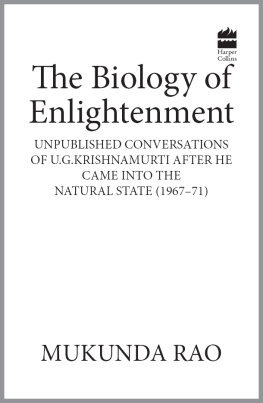Krishnamurti - Talks in Europe 1967
Here you can read online Krishnamurti - Talks in Europe 1967 full text of the book (entire story) in english for free. Download pdf and epub, get meaning, cover and reviews about this ebook. publisher: Krishnamurti Foundation Trust, genre: Religion. Description of the work, (preface) as well as reviews are available. Best literature library LitArk.com created for fans of good reading and offers a wide selection of genres:
Romance novel
Science fiction
Adventure
Detective
Science
History
Home and family
Prose
Art
Politics
Computer
Non-fiction
Religion
Business
Children
Humor
Choose a favorite category and find really read worthwhile books. Enjoy immersion in the world of imagination, feel the emotions of the characters or learn something new for yourself, make an fascinating discovery.

- Book:Talks in Europe 1967
- Author:
- Publisher:Krishnamurti Foundation Trust
- Genre:
- Rating:3 / 5
- Favourites:Add to favourites
- Your mark:
- 60
- 1
- 2
- 3
- 4
- 5
Talks in Europe 1967: summary, description and annotation
We offer to read an annotation, description, summary or preface (depends on what the author of the book "Talks in Europe 1967" wrote himself). If you haven't found the necessary information about the book — write in the comments, we will try to find it.
Talks in Europe 1967 — read online for free the complete book (whole text) full work
Below is the text of the book, divided by pages. System saving the place of the last page read, allows you to conveniently read the book "Talks in Europe 1967" online for free, without having to search again every time where you left off. Put a bookmark, and you can go to the page where you finished reading at any time.
Font size:
Interval:
Bookmark:
Talks in Europe 1967
Copyright 1968 Krishnamurti Foundation Trust Ltd.
J. KRISHNAMURTI
TALKS
IN EUROPE
1967
CONTENTS
FIVE TALKS IN PARIS
I think there are really two fundamental problems, violence and sorrow. Unless we solve these, and go beyond them, all our efforts, our constant battles, have very little meaning. We seem to spend most of our lives within the field of ideologies, formulas, concepts, and by means of these we try to solve these two essential problems, violence and sorrow.
Every form of conflict is violence, not only the psychological conflict, within the skin, but also outwardly, in our relationships with other human beings, with society. And sorrow, it seems to me, is one of the most complex and difficult problems; the very complexity of it needs to be approached very simply. Any complex problemespecially a human problem, and we have many of themmust surely be approached very clearly, very simply, without any ideological background; otherwise we translate what we see according to the conditioning and the peculiar idiosyncrasies and intentions that we have.
To understand the two essentially deep-rooted problems of violence and sorrow, we must not approach them merely verbally or intellectually; the intellect doesnt solve any problem at all, it may explain problemsany clever person can explain problemsbut the explanation, however erudite, however subtle, is not the reality. It is no use explaining to a man who is very hungry what marvellous food there is, it has no value at all. But if we go into these questions, not intellectually, but actually, totally, come to grips with them, unravelling these two terrible problems that destroy the mind, then perhaps we might go beyond.
We, as human beings, have accepted violence and sorrow as a way of life; having accepted them, we try to make the best of them. We worship sorrow, idealize it, and abide with it, as in the Christian world. In the Eastern world it is translated in other ways, but again the solution is not found. And as we said, this violence we have inherited from the animal, this aggression, this domination, with the desire for power, position and the urge to fulfil. Our brain structure, which we have inherited from the animal, is itself the product of evolution; its function is not only to be self-protective but also to be aggressive, to be violent, to be very dominating, thinking in terms of position, prestige, with all of which you are all quite familiar.
Sorrow, the self-pity which is part of that sorrow, the loneliness, the utter meaninglessness of life, the boredom, the routine, deprive life of all sense of purpose, so we invent purpose; the intellectuals put together ideological purpose according to which we try to live. And not being able to solve these problems we go back to something that has been, either in our youth, or to the culture of tradition, depending upon race, country, and so on. The more the problem becomes urgent, the more we escape to some form of ideological explanation from the past or to some ideological concept of the future, and we remain caught in this trap. And one observes, both in the East and in the West, the escapes into every form of entertainment, whether it is the entertainment of the Church, or the entertainment of football, or the cinemaand all the rest. The demand for entertainment, for distraction takes extraordinary forms: going to museums, talking endlessly about music, about the latest books, or writing about something which is dead and gone and buried, which has no value at all.
Apparently there are very few who are really serious. I mean by that word serious the ability to go through a problem to the very end and resolve it; not resolving it according to ones personal inclination, or temperament, or according to the compulsion of environment, but putting all that aside, finding the truth of the matter, pursuing it to the very end. Such seriousness, it seems, is rather rare. And if one would solve these two fundamental issues, of violence and sorrow, one has to be serious and also one has to have a certain awareness, a certain attention, for nobody is going to solve these problems for us, obviously no old religions or carefully planned organizations, worked out by some authority or by the priestnobody in that category is going to help us. Its very obvious that they have no meaning at allyou can see throughout the world the so-called young people are throwing all those out of the window; they have no meaningthe Church, the Gods, the beliefs, the dogmas, the rituals. And such authorities have ceased to have meaning for any serious man; obviously, when the world is in such confusion and misery, merely to look to some kind of authorityespecially such organized authority as religious planning with sanctionshas no meaning whatsoever.
One cannot rely on anybody, on saviours, masters, not on anybody, including the speaker. And when we have rejected totally all the books, philosophies, the saints and the anarchists, we are face to face with ourselves as we are. That is a frightening and rather a depressing thing: to see ourselves actually as we are. No amount of philosophy, no amount of literature, dogma, ritual is ever going to solve this violence and sorrow. I think one has ultimately to come to this point and to resolve and go beyond. The more earnest one is, the more immediate the problem, the very urgency of it denies the authority one has so easily accepted.
Another problem is that of how to look into, and how to observe violence and sorrow as they exist in us. As we have said, human beings as individuals are the product of society, of the culture in which we live, and that society and culture have been built by each one of us. Society is the product of human beings and we are of that product; and we are caught in this situation. We are caught in the trap of our individual inclinations, tendencies and pleasures and these are the structure of society. We are apt to regard the individual and society as two different things; and then it may be askedWhat value has a human being who changes himself with regard to the whole structure of society?which seems to me an absurd question.
We are dealing neither with an individual nor with a particular society, French, English, or whatever it is, but with the whole human problem. We are not dealing with the individual in relation to society or with the relationship of society, the collective, to the individual; we are trying to deal with the whole issue, not any separate issue.
We can only understand something when we see the totality of it, when we see its whole structure and the meaning of it. You cannot see the whole pattern of life, the whole movement of life, if you merely take one part of it and are tremendously concerned about that particular part. It is only when we see the whole map that we can see where we are and choose a particular road. So we are not concerned with individual salvation or individual liberation, or whatever the individual is trying to seek, but rather with the whole movement of life, the understanding of the whole current of existence; then perhaps the individual problems can be approached entirely differently. It becomes extremely difficult to see the whole issue, to understand itit demands attention. One cannot understand anything intellectuallyyou may hear words, give explanations, find out the cause, but that is not understanding. Understandingas one observes oneselftakes place only when the mind, including the brain, is totally attentive. And one is not attentive when one is interpreting and translating what one sees according to ones background. You must have noticedobviously most of us havethat when the mind is completely quietnot demanding, not fussing around, not tearing to pieces the problem, but really facing the problem with complete quietnessthen there is an understanding. That very understanding is the action, the liberating force or energy, which frees us from the problem. So we are using the word understand in that sense, not intellectual or emotional understanding. And this understanding is rather a negation of the positive, the positive being understanding with the motive to do something about it. Most of us, when we have a problem, are inclined to worry about it, to tear it to pieces, to analyse it, to find a formula for dealing with it. And thoughtas one may observeis always the response of the old; thought is never new, yet the problem is always new. We translate the new, the problem, in terms of thought, and thought which is old is therefore positive, and active to do something about it.
Next pageFont size:
Interval:
Bookmark:
Similar books «Talks in Europe 1967»
Look at similar books to Talks in Europe 1967. We have selected literature similar in name and meaning in the hope of providing readers with more options to find new, interesting, not yet read works.
Discussion, reviews of the book Talks in Europe 1967 and just readers' own opinions. Leave your comments, write what you think about the work, its meaning or the main characters. Specify what exactly you liked and what you didn't like, and why you think so.








